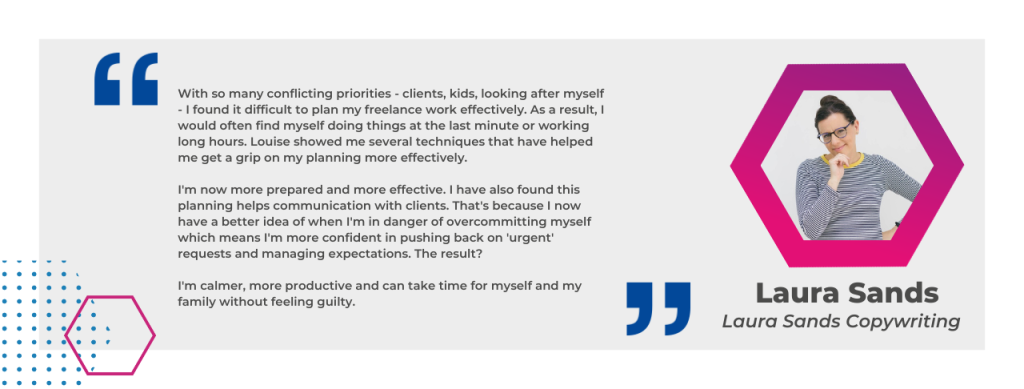Did you know that we are 42% more likely to keep to a plan when we write it down? Amazingly, if we share that plan, our chances of sticking to it increase to 65%. Even more impressive is the fact that if we then share our progress, that increases again to 95%!
As impressive as these statistics are, I find people often struggle with how to write a plan. With this in mind, here are five tips to assist you in writing an effective plan. Nail this, and you’ll be able to create more complex plans that work over longer periods.
1. Review where you are now
When thinking about how to write a plan, the best way to start is to review where you are now and to consider your performance over a similar period to your new plan.
Review your progress by asking yourself:
- What went well?
- What didn’t go so well?
- What would you like to do more of?
- And what would you like to do less of?
With these answers, you are better placed to understand what you hope to achieve for the next quarter/ year.
💡Think about this: Reflect on these questions from both a business and personal perspective. As an owner of a small business, what happens in your personal life has a direct impact on your business. The reverse is also true.
2. Set your goals
Whether it’s a business goal, a personal development objective, or something more personal such as taking the family on a luxury holiday, having a clear vision sets the tone for your entire plan.
Be creative when considering your goals, there’s no need to stick to the same old things. Here are seven to get you thinking about how to write your plan and goals:
- Proactively caring for your physical and mental health
- Personal development,
- Investing in technology
- Introducing a new service
- Improving your client engagement and journey
- New marketing approaches
- Investing in team engagement and training
The number of goals you set depends on the time period. If you’re creating a 90-day plan, I’d suggest aiming for three but no more than five.
💡Think about this: It’s important to include a revenue / profit-based goal for your business. I’d also recommend adding one or two personal goals.
3. Develop your plan & make it actionable
Now it’s time to make your objectives SMART:
With your goals fully established it’s time to break them down into actionable steps. What tasks need to be completed to achieve your goals? Identifying this makes your plan more manageable and provides a clear roadmap.
💡Think about this: If you or your team are more visual thinkers – for example if you are a creative agency or similar – you may find a vision board helps you stay in touch with your objectives and reinforces your written goals. Not sure where to start? Canva has lots of free templates to inspire you.
4. Define roles and responsibilities
Planning will only take you so far – you also need to assign owners to each task.
Starting by defining who will be doing which task – an important part of how to write a plan. Then, state their next actions and assign a completion date. I find a spreadsheet is the best way of doing this.
If you are a small business with a team or have suppliers involved in certain projects or actions, ensure you have regular meetings to communicate where everyone is with each action. It’s essential to keep the plan up-to-date and on a shared drive – this allows everyone access and encourages shared ownership.
💡Think about this: Who can you call on to help you move forward? Even solo business owners don’t need to go it alone! Think about suppliers or part of your team, if you have one.
5. Commit time to execute, review and make adjustments
Now it’s time to start executing your plan. Set aside a protected amount of time each week to progress the actions you have responsibility for.
Regularly review the plan to ensure you and your team are on track, and make amendments where required. I suggest doing this at the times you have set aside to work on your actions.
At the end of the period, review the plan in its entirety.
What were your highlights and achievements? Make sure you celebrate these. Take your team out for lunch or book in a night out together. If you work alone perhaps you take a trip to the theatre with a friend or your partner.
What didn’t go so well? Why was this? Every missed opportunity is a chance to learn. Running a post-mortem can help you analyse why things turned out the way they did and what you could do differently next time, especially now you know how to write a plan.
💡Think about this: Things change and it’s fine to make adjustments. Your business is a living creation, so respond to changes in the marketplace, your personal circumstances and your team.
A well-crafted plan is a roadmap to success. Whether you’re navigating the business world or seeking personal aspirations, knowing how to write a plan will mean you create projects and plans that are realistic, actionable, and tailored to your unique journey, so you can achieve the goals you set yourself.
Would you like help with how to write a plan for 2024? Let me know – my 121 goal-setting sessions are the perfect way to set your business up for success in 2024 and beyond.

